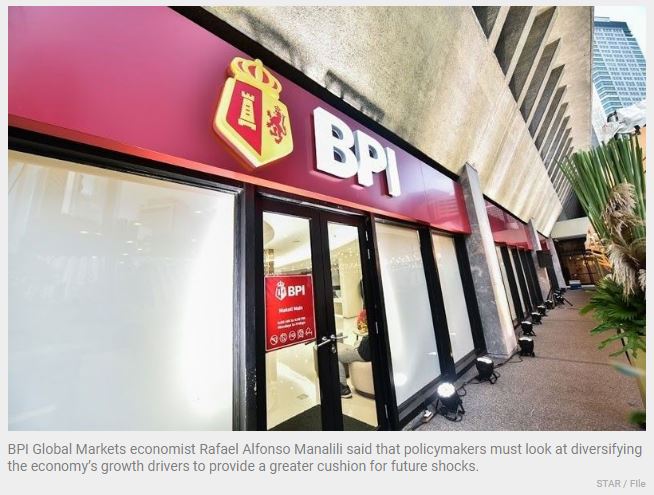Philippines: BPI sees slower 5-6% GDP growth
MANILA, Philippines — Bank of the Philippine Islands (BPI) sees a slower economic growth this year with the gross domestic product (GDP) expansion slowing to five to six percent from 7.6 percent last year.
BPI Global Markets economist Rafael Alfonso Manalili said that policymakers must look at diversifying the economy’s growth drivers to provide a greater cushion for future shocks.
“The long-term prospects of the economy are good overall. We believe that the economy will continue to grow in the coming years at a healthy pace, not only this year, because of our growth drivers,” Manalili said.
The Ayala-led bank expects the economy to grow between five and six percent in 2023 as local and global headwinds continue to weigh on growth.
Manalili pointed out that new growth drivers must come to the fore to ensure a more robust and faster economic recovery, citing the vulnerability of the current structure of the economy.
“The Philippine economy is a consumer-driven economy, and we have a strong consumer base. It’s an asset that has allowed us to grow by at least 6% in the past decade, but this makes us vulnerable in the context of a pandemic,” he said.
After exiting the pandemic-induced recession with a GDP growth of 5.7 percent in 2021, the Philippines managed to sustain its growth momentum with a GDP expansion of 7.6 percent last year, slightly higher than the 6.5 to 7.5 percent target penned by economic managers.
The Philippines slipped into recession with a GDP contraction of 9.6 percent in 2020 as the economy stalled due to strict COVID-19 quarantine and lockdown protocols.
The 171-year old bank remains cautiously optimistic about the country’s economic recovery as it sees encouraging progress in consumer spending, remittances, and revenues from the business process outsourcing sector.
One of the headwinds is high inflation which continues to beset consumer spending.
According to Manalili, inflation has gone up significantly and it has a significant impact on the economy because we are a consumer-driven economy.
“We expect average inflation to settle within the 4.5 to 5.5 percent range this year. The decline in inflation will be gradual or slow because of persistent supply constraints especially in the agriculture sector,” he added.
Inflation accelerated to a 14-year high of 8.7 percent in January from 8.1 percent in December. It averaged 5.8 percent in 2022, exceeding the two to four percent target of the Bangko Sentral ng Pilipinas (BSP) from 3.9 percent in 2021.
Another headwind is the aggressive interest rate hikes by central banks that are necessary to rein in the high inflation.
“It makes the cost of financing projects and investing in hard assets like equipment and factories more expensive. It might prevent the private sector from ramping up their capital expenditures,” he said.
BPI expects additional rate hikes throughout the first half of 2023 before a pause in the second half and possibly even a rate cut if the US enters a recession, which could force the Federal Reserve to cut their rates.
It believes household consumption and services were the ones most affected by the pandemic as people stayed at home for quarantine.
“The pandemic has taught us that we need to diversify our growth drivers. We need to go beyond household consumption and services so that we can have an additional cushion in case another shock happens. This will allow us to grow faster and will protect us from external shocks like the COVID-19 pandemic,” Manalili said.
He stressed the need for the government to fast-track infrastructure development to attract more investments.
The Philippine GDP declined by almost 10 percent during the global health crisis, the biggest contraction in the ASEAN region, and has recovered more gradually compared to other ASEAN countries.
The country’s per capita GDP is still lower than the pre-pandemic level following the COVID shock. This would have been avoided if the growth drivers were more diversified.
Source: https://www.philstar.com/business/2023/02/17/2245434/bpi-sees-slower-5-6-gdp-growth


 Thailand
Thailand




